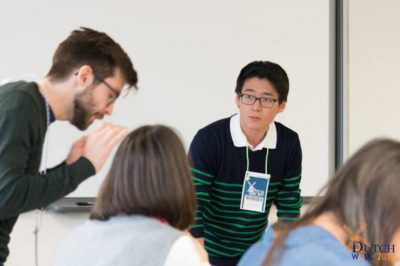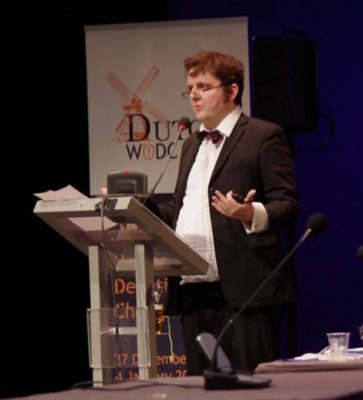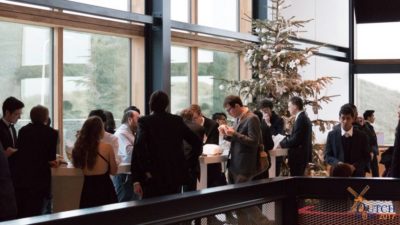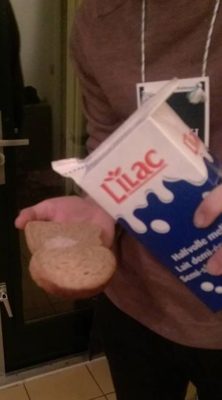The good, the bad and the bread – A review of WUDC 2017
With debaters from all around the world recovering on their travels back home, it’s time to look back at the ups and downs of the tournament. Helena Hecke commented on the Dutch WUDC experience.
The debating world has once more crowned the best debaters in the world. This year it’s USU A from Sydney in the Open category, Tel Aviv A in the ESL category and Belgrade C in the EFL category.
But celebrating the new world champions is not all that has happened at this year’s Worlds.
The debating:
Of course debating is the most important aspect at WUDC. This year, the Adjudication Core has successfully set motions which, despite not always being fun, were in most cases balanced (See here) (even if not at first sight).
The quality of the debates got improved by the fact that people from around the world with different styles expressed their arguments on politics, labour unions, sports and much more.

Debating the inrounds – © Dutch WUDC 2017
Judging or speaking in a round at WUDC is a completely different experience compared to a national tournament or training at one’s own society. Since different backgrounds enable different kinds of world-views and perspectives on various topics, one cannot assume a shared ground of knowledge or assumptions – may it be when debating the importance of a military or the expansion of cities. A minor difference in perspectives, which one might think couldn’t make a big change, can lead to completely different sets of arguments.
A funny coincidence also happened in the allocation of judges. A mistake on the tab resulted in a judge called ‘Judge 240’ being assigned to all rounds, despite never showing up because it was a error in the tab and therefore a ghost judge. I myself had the honour of being on a panel with Judge 240 – the experience was spooky.
Judge 240 was not the only surprise, however. Visa permit issues prevent one of the judges from travelling to the Netherlands, yet despite not having judged a single round, the judge was broken to the outrounds (quite an achievement one may say!). Other formidable judges that were present however, and have broken at internationals before, did not break.
Another first-time incident also happened this year. A team dropped out of Open Quarters, due to schedule issues with their flight, allowing another team to proceed.

Duncan Crowe at his 3rd Master’s Final – © DutchWUDC2017
Some of the adjudicators had the pleasure of taking part in the Masters competition, arguing about the cultural importance of X-Factor, the possible destruction of human kind and about who could have saved Harambe; all in a debating format nobody really understood or liked, including the Dutch CA. The final ultimately consisted out of four veteran debaters – a debate which not only made us laugh, but also introduced the audience to some horror stories of the debating community. The winner (despite the actual winners) was the chair of the round, Crash Wigley, who made the best jokes of all. We’ll probably also see Duncan Crowe in the Masters finals next year again, ever struggling to become the winner of this fun-competition.
Once more the debating community received many new You Tube recordings of exceptional debates in the out rounds, which will be watched over and over again for the purpose of acquiring the same skill-set one day.
The organisation:
A round of applause for the organization committee of Dutch Worlds! Together with the Tab team they managed to run a WUDC on time, sometimes even ahead of schedule. Everyone always ended up where they were supposed to be, not saying that everyone always wanted to be there (e.g. at obnoxious socials).
Their tournament organization skills were outstanding, their skill of organizing socials not so much. The opening ceremony will most likely be remembered for the long waiting time and the horrendous price for water. The closing ceremony was no improvement, mainly due to an unfortunate choice for the dinner location. Most other socials took place in the Vakantjepark itself, which resulted in very few people going there, either because they wanted to sleep or because they had their own parties in their accommodations.

The Closing Ceremony Dinner – © Dutch WUDC 2017
Participants of Dutch WUDC also had to painfully learn that the Dutch cuisine is fanatic about bread, since it was served for breakfast and lunch on every single day.

Dutch Culinary adventure – © private
By day three, everyone suffered from an overdose of bread and “Melk” (Melk is Dutch for milk), making the theme of the tournament (“Hunger Games”) quite ironic. Most might not have enjoyed the food, but at least it certainly gave people amazing material for many jokes, memes and complaints, as there was not much else to really complain about. Worlds 2017 has really showed us that debating is in fact not a breadless game.
Although everyone was accommodated in the Vakantjepark Kijkduin, not all had the same quality of accommodation. Participants were located either in small houses with lots of comfort, or unfortunately in what became known as the ‘The Squatters’, a rather unhomely trailer park. Therefore, opinions about the quality of accommodation differed substantially – yet all agreed that it was located too far from the city centre, places to get food and especially the bus stop.
Overall, Dutch WUDC was a perfectly organized tournament, with a qualified CA team, balanced motions, terrible food and far too much Melk.
We wish the 2018 conveners of WUDC, in the spirit of this year’s Masters of Ceremony: May the odds be ever in your favour!
hh./jm./msi./lok.
Helena Hecke started debating in high school three years ago and is now debating for Tilbury House Cologne. She has won Maastricht Novice and broke both as a speaker and as a judge at some competitions. Apart from debating, Helena is a first year Law student with a mild obsession about books.





